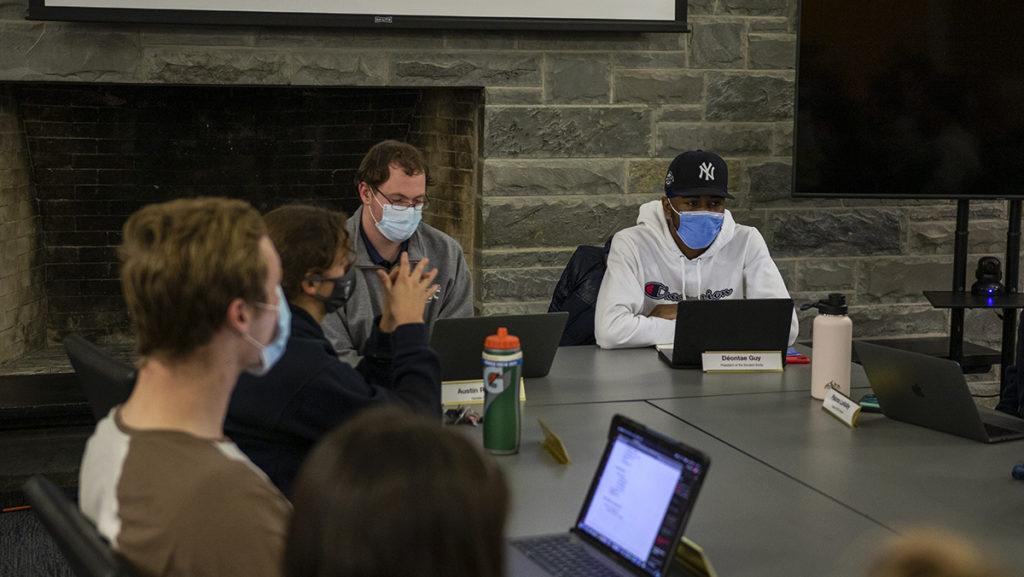Samm Swarts, assistant director of Emergency Preparedness and Response, spoke with the Ithaca College Student Governance Council (SGC) about areas of concern students have with the college’s response to COVID-19 at its Nov. 8 meeting.
Swarts focused on three areas that he said multiple students had brought concerns of to him: volunteer surveillance testing, the community agreement reporting form and the employee vaccination rate. Many students have brought up concerns over what they see as a lack of clear communication in regards to the surveillance testing.
In a Sept. 3 announcement, the college stated that voluntary testing would be conducted by selecting random groups of vaccinated students, faculty and staff every Monday.
Swarts said there are currently no guidelines in place from the Centers for Disease Control and Prevention (CDC) or New York state for stipulating mandatory testing for vaccinated individuals. There is currently an over 99% vaccination rate for students on campus.
“We heard a lot of feedback at the beginning of the semester from the student body about … not feeling really so comfortable at the idea of coming back in person and us just jumping straight in,” Swarts said. “So that’s why we went with a voluntary testing program.”
Swarts also highlighted the community agreement reporting form, which allows students and employees to report incidents that raise health and safety concerns related to COVID-19.
The form allows the ability to report specific involved parties, details and documentation related to the violations.
Senior Leticia Guibunda, vice president of campus affairs, asked Swarts how disciplinary action for employees would work in regards to the violation reporting form.
“It would work through the faculty’s dean’s office first to have a conversation about what specifically is going on, and try to correct [the behavior],” Swarts said. “If it continues to become a bigger issue, then we would call Human Resources to potentially [dispense] disciplinary action against the faculty member.”
Guibunda asked Swarts about the section of the form that allows students and employees to follow up on actions taken in response to individual reports.
“If a student wants to report something anonymously, are they still able to get the follow up report sent to them?” Guibunda said.
Swarts said there is no way to follow up when someone submits anonymously, because the only data recorded is the date and time that the form was submitted for anonymous reports.
Swarts spoke about the concern from students about a lack of a vaccine mandate for employees. All students have been required to be vaccinated for the semester.
On Sept. 13, the SGC passed the Employee Vaccination Bill, a recommendation to mandate the vaccine for all employees. At its Oct. 5 meeting, the Faculty Council voted in support of the recommendation, although there was discussion about the negative impact the mandate might have on employee retention.
Swarts said the number of both student and employee COVID-19 contraction rates have been low overall this semester.
Junior Lila Weiser, senator-at-large, asked how the college plans to follow President Joe Biden’s vaccine mandate for workplaces with over 100 employees if the plan progresses.
The plan requires that companies must ensure that their employees are fully vaccinated or test negative once a week. The rule does not require employers to cover testing, but does require that employees get paid time off to get vaccinated, which appears to be an incentive for individuals to choose the vaccination over testing. The plan was blocked Nov. 7 by the U.S Court of Appeals.
Swarts said that he is working through the newest Occupational Safety and Health Administration (OSHA) guidelines which were released Nov. 6 with the Office of Human Resources at the college. OSHA published its “COVID-19 Vaccination and Testing; Emergency Temporary Standard (ETS)” which applies the same standard of testing for companies with 100 or more employees as Biden’s proposal. The ETS is a temporary measure to last for a maximum of six months.
Junior Austin Ruffino, senate chair, asked Swarts if he or the college have any plans to change the current COVID-19 protocols for the spring.
Swarts said that within the last week, the college has lifted some of its masking requirements in regards to performances in various schools. Swarts said they were able to lift these requirements because there is a low rate of transmission within classroom spaces.
Swarts said he is hopeful for the spring semester, but stressed the importance of following current guidelines.
“I’m personally very hopeful that perhaps in our spring semester … we might be able to relax some [more] restrictions,” Swarts said. “But I want to caution and say what we know today at this very moment may not be what it is next week, two weeks, a month …I would encourage us all to keep being cautious, and to continue following our health and safety protocols as they stand right now.”








